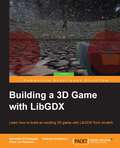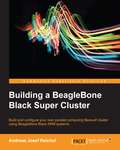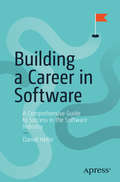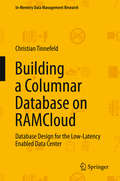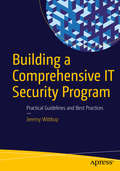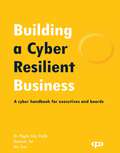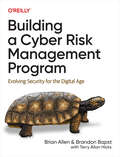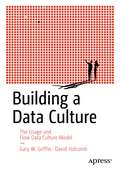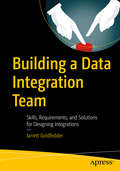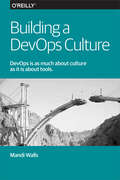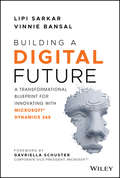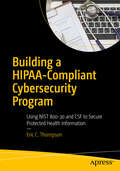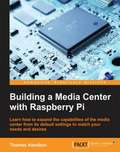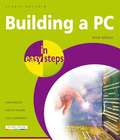- Table View
- List View
Building a 2D Game Physics Engine: Using HTML5 and JavaScript
by Jebediah Pavleas Kelvin Sung Michael Tanaya Huaming ChenBuild your very own 2D physics-based game engine simulation system for rigid body dynamics. Beginning from scratch, in this book you will cover the implementation technologies, HTML5 and JavaScript; assemble a simple and yet complete fundamental mathematics support library; define basic rigid body behaviors; detect and resolve rigid body collisions; and simulate collision responses after the collisions. In this way, by the end of Building a 2D Game Physics Engine, you will have an in‐depth understanding of the specific concepts and events, implementation details, and actual source code of a physics game engine that is suitable for building 2D games or templates for any 2D games you can create and can be played across the Internet via popular web‐browsers. What You'll Learn Gain an understanding of 2D game engine physics and how to utilize it in your own games Describe the basic behaviors of rigid bodies Detect collisions between rigid bodies Resolve interpretations after rigid body collisions Model and implement rigid body impulse responses Who This Book Is For Game enthusiasts, hobbyists, and anyone who is interested in building their own 2D physics game engines but is unsure of how to begin.
Building a 3D Game with LibGDX
by Elmar Van Rijnswou Sebastian Di Giuseppe Andreas KruhlmannLearn how to build an exciting 3D game with LibGDX from scratch About This Book * Implement an exhaustive list of features that LibGDX unleashes to build your 3D game. * Write, test, and debug your application on your desktop and deploy them on multiple platforms. * Gain a clear understanding of the physics behind LibGDX and libraries like OpenGL and WebGL that make up LibGDX. Who This Book Is For If you are a game developer or enthusiasts who want to build 3D games with LibGDX, then this book is for you. A basic knowledge of LibGDX and Java programming is appreciated. What You Will Learn * Learn the potential of LibGDX in game development * Understand the LibGDX architecture and explore platform limitation and variations * Explore the various approaches for game development using LibGDX * Learn about the common mistakes and possible solutions of development * Discover the 3D workflow with Blender and how it works with LibGDX * Implement 3D models along with textures and animations into your games * Familiarize yourself with Scene2D and its potential to boost your game's design In Detail LibGDX is a hugely popular open source, cross-platform, Java-based game development framework built for the demands of cross-platform game development. This book will teach readers how the LibGDX framework uses its 3D rendering API with the OpenGL wrapper, in combination with Bullet Physics, 3D Particles, and Shaders to develop and deploy a game application to different platforms You will start off with the basic Intellij environment, workflow and set up a LibGDX project with necessary APIs for 3D development. You will then go through LibGDX's 3D rendering API main features and talk about the camera used for 3D. Our next step is to put everything together to build a basic 3D game with Shapes, including basic gameplay mechanics and basic UI. Next you will go through modeling, rigging, and animation in Blender. We will then talk about refining mechanics, new input implementations, implementing enemy 3D models, mechanics, and gameplay balancing. The later part of this title will help you to manage secondary resources like audio, music and add 3D particles in the game to make the game more realistic. You will finally test and deploy the app on a multitude of different platforms, ready to start developing your own titles how you want! Style and approach A step by step guide on building a 3D game with LibGDX and implementing an exhaustive list of features that you would wish to incorporate into your 3D game
Building a BeagleBone Black Super Cluster
by Andreas Josef ReichelIf you are a programmer, scientist, or someone interested in modern computer technology that goes beyond the typical PC, then this book will show you the outstanding possibilities of cluster computing with modern embedded systems based on ARM architecture. Whether you need a high-speed or low-cost scalable cluster for simulations or want to try something new, this book is the right guide for you.
Building a Career in Software: A Comprehensive Guide to Success in the Software Industry
by Daniel HellerSoftware engineering education has a problem: universities and bootcamps teach aspiring engineers to write code, but they leave graduates to teach themselves the countless supporting tools required to thrive in real software companies. Building a Career in Software is the solution, a comprehensive guide to the essential skills that instructors don't need and professionals never think to teach: landing jobs, choosing teams and projects, asking good questions, running meetings, going on-call, debugging production problems, technical writing, making the most of a mentor, and much more. In over a decade building software at companies such as Apple and Uber, Daniel Heller has mentored and managed tens of engineers from a variety of training backgrounds, and those engineers inspired this book with their hundreds of questions about career issues and day-to-day problems. Designed for either random access or cover-to-cover reading, it offers concise treatments of virtually every non-technical challenge you will face in the first five years of your career—as well as a selection of industry-focused technical topics rarely covered in training. Whatever your education or technical specialty, Building a Career in Software can save you years of trial and error and help you succeed as a real-world software professional.What You Will LearnDiscover every important nontechnical facet of professional programming as well as several key technical practices essential to the transition from student to professionalBuild relationships with your employerImprove your communication, including technical writing, asking good questions, and public speakingWho This Book is ForSoftware engineers either early in their careers or about to transition to the professional world; that is, all graduates of computer science or software engineering university programs and all software engineering boot camp participants.
Building a Columnar Database on RAMCloud: Database Design for the Low-Latency Enabled Data Center (In-Memory Data Management Research)
by Christian TinnefeldThis book examines the field of parallel database management systems and illustrates the great variety of solutions based on a shared-storage or a shared-nothing architecture. Constantly dropping memory prices and the desire to operate with low-latency responses on large sets of data paved the way for main memory-based parallel database management systems. However, this area is currently dominated by the shared-nothing approach in order to preserve the in-memory performance advantage by processing data locally on each server. The main argument this book makes is that such an unilateral development will cease due to the combination of the following three trends: a) Today's network technology features remote direct memory access (RDMA) and narrows the performance gap between accessing main memory on a server and of a remote server to and even below a single order of magnitude. b) Modern storage systems scale gracefully, are elastic and provide high-availability. c) A modern storage system such as Stanford's RAM Cloud even keeps all data resident in the main memory. Exploiting these characteristics in the context of a main memory-based parallel database management system is desirable. The book demonstrates that the advent of RDMA-enabled network technology makes the creation of a parallel main memory DBMS based on a shared-storage approach feasible.
Building a Comprehensive IT Security Program: Practical Guidelines and Best Practices
by Jeremy WittkopThis book explains the ongoing war between private business and cyber criminals, state-sponsored attackers, terrorists, and hacktivist groups. Further, it explores the risks posed by trusted employees that put critical information at risk through malice, negligence, or simply making a mistake. It clarifies the historical context of the current situation as it relates to cybersecurity, the challenges facing private business, and the fundamental changes organizations can make to better protect themselves. The problems we face are difficult, but they are not hopeless. Cybercrime continues to grow at an astounding rate. With constant coverage of cyber-attacks in the media, there is no shortage of awareness of increasing threats. Budgets have increased and executives are implementing stronger defenses. Nonetheless, breaches continue to increase in frequency and scope. "Building a Comprehensive IT Security Program "shares why organizations continue to fail to secure their critical information assets and explains the internal and external adversaries facing organizations today. This book supplies the necessary knowledge and skills to protect organizations better in the future by implementing a comprehensive approach to security. Jeremy Wittkop s security expertise and critical experience provides insights into topics such as: Who is attempting to steal information and why?What are critical information assets?How are effective programs built?How is stolen information capitalized?How do we shift the paradigm to better protect our organizations?How we can make the cyber world safer for everyone to do business? "
Building a Cyber Resilient Business: A cyber handbook for executives and boards
by Shamane Tan Hai Tran Dr. Magda ChellyLearn how to build a proactive cybersecurity culture together with the rest of your C-suite to effectively manage cyber risksKey FeaturesEnable business acceleration by preparing your organization against cyber risksDiscover tips and tricks to manage cyber risks in your organization and build a cyber resilient businessUnpack critical questions for the C-suite to ensure the firm is intentionally building cyber resilienceBook DescriptionWith cyberattacks on the rise, it has become essential for C-suite executives and board members to step up and collectively recognize cyber risk as a top priority business risk. However, non-cyber executives find it challenging to understand their role in increasing the business's cyber resilience due to its complex nature and the lack of a clear return on investment.This book demystifies the perception that cybersecurity is a technical problem, drawing parallels between the key responsibilities of the C-suite roles to line up with the mission of the Chief Information Security Officer (CISO).The book equips you with all you need to know about cyber risks to run the business effectively. Each chapter provides a holistic overview of the dynamic priorities of the C-suite (from the CFO to the CIO, COO, CRO, and so on), and unpacks how cybersecurity must be embedded in every business function. The book also contains self-assessment questions, which are a helpful tool in evaluating any major cybersecurity initiatives and/or investment required.With this book, you'll have a deeper appreciation of the various ways all executives can contribute to the organization's cyber program, in close collaboration with the CISO and the security team, and achieve a cyber-resilient, profitable, and sustainable business.What you will learnUnderstand why cybersecurity should matter to the C-suiteExplore how different roles contribute to an organization's securityDiscover how priorities of roles affect an executive's contribution to securityUnderstand financial losses and business impact caused by cyber risksCome to grips with the role of the board of directors in cybersecurity programsLeverage the recipes to build a strong cybersecurity cultureDiscover tips on cyber risk quantification and cyber insuranceDefine a common language that bridges the gap between business and cybersecurityWho this book is forThis book is for the C-suite and executives who are not necessarily working in cybersecurity. The guidebook will bridge the gaps between the CISO and the rest of the executives, helping CEOs, CFOs, CIOs, COOs, etc., to understand how they can work together with the CISO and their team to achieve organization-wide cyber resilience for business value preservation and growth.
Building a Cyber Risk Management Program: Evolving Security for the Digital Age
by Brian Allen Brandon Bapst Terry Allan HicksCyber risk management is one of the most urgent issues facing enterprises today. This book presents a detailed framework for designing, developing, and implementing a cyber risk management program that addresses your company's specific needs. Ideal for corporate directors, senior executives, security risk practitioners, and auditors at many levels, this guide offers both the strategic insight and tactical guidance you're looking for.You'll learn how to define and establish a sustainable, defendable, cyber risk management program, and the benefits associated with proper implementation. Cyber risk management experts Brian Allen and Brandon Bapst, working with writer Terry Allan Hicks, also provide advice that goes beyond risk management. You'll discover ways to address your company's oversight obligations as defined by international standards, case law, regulation, and board-level guidance.This book helps you:Understand the transformational changes digitalization is introducing, and new cyber risks that come with itLearn the key legal and regulatory drivers that make cyber risk management a mission-critical priority for enterprisesGain a complete understanding of four components that make up a formal cyber risk management programImplement or provide guidance for a cyber risk management program within your enterprise
Building a Data Culture: The Usage and Flow Data Culture Model
by Gary W. Griffin David HolcombIn today's fast-paced digital landscape, organizations face an ever-increasing volume of data that holds immense potential for driving business success. However, many businesses struggle to harness this potential due to a lack of understanding and effective utilization of data within their culture. This book is a comprehensive guide that unveils the transformative power of data and provides actionable insights to cultivate a data-driven organizational culture.The book emphasizes data strategy and data governance's pivotal role in cultivating a mature data culture using practical insights, frameworks, and best practices. This approach ensures robust data culture structures that uphold data integrity, accessibility, and accountability. These structures operate on the people, processes, and technology through analytics, literacy, governance, process management, and data inventory management.The authors introduce the groundbreaking Usage and Flow Data Culture Model, a unique framework that enables organizations to evaluate and reshape their data culture based on distinct cultural types: Preservationist, Protectionist, Traditionalist, and Progressive. Each culture type is carefully dissected, revealing associated challenges and opportunities, uncovering suitable strategies in the process. Developing a worthy data culture necessitates a shift in mindset and the development of relevant skills across the organization. Building a Data Culture is your roadmap to fostering data literacy, promoting data-driven decision-making, and cultivating a data-driven mindset. What You'll LearnAssess your organization's current data cultureIdentify cultural strengths and weaknesses within your organizationDevelop a data governance programDefine data policies and standards and establish decision-making processesWho This Book is ForProfessionals and leaders across various industries who are interested in building a data culture within their organizations. The typical reader may have a background in data management, analytics, business intelligence, or technology, but the book is designed to be accessible to a wide range of readers with varying levels of expertise.
Building a Data Integration Team: Skills, Requirements, and Solutions for Designing Integrations
by Jarrett GoldfedderFind the right people with the right skills. This book clarifies best practices for creating high-functioning data integration teams, enabling you to understand the skills and requirements, documents, and solutions for planning, designing, and monitoring both one-time migration and daily integration systems.The growth of data is exploding. With multiple sources of information constantly arriving across enterprise systems, combining these systems into a single, cohesive, and documentable unit has become more important than ever. But the approach toward integration is much different than in other software disciplines, requiring the ability to code, collaborate, and disentangle complex business rules into a scalable model. Data migrations and integrations can be complicated. In many cases, project teams save the actual migration for the last weekend of the project, and any issues can lead to missed deadlines or, at worst, corrupted data that needs to be reconciled post-deployment. This book details how to plan strategically to avoid these last-minute risks as well as how to build the right solutions for future integration projects. What You Will Learn Understand the “language” of integrations and how they relate in terms of priority and ownershipCreate valuable documents that lead your team from discovery to deploymentResearch the most important integration tools in the market todayMonitor your error logs and see how the output increases the cycle of continuous improvementMarket across the enterprise to provide valuable integration solutions Who This Book Is For The executive and integration team leaders who are building the corresponding practice. It is also for integration architects, developers, and business analysts who need additional familiarity with ETL tools, integration processes, and associated project deliverables.
Building a Debugger: Write a Native x64 Debugger From Scratch
by Sy BrandMaster the inner workings of your x64 Linux system and expand your OS expertise by writing your very own debugger using C++.If debuggers seem like magic to you, there is no better way to demystify them than to write your own. This book will show you exactly how to do it, walking you through the entire process of building a debugger for x64 Linux systems using C++. As go from an empty filesystem folder to a fully fledged debugger capable of setting breakpoints, stepping through code, manipulating variables, and more, you&’ll learn how to:Attach to a processRead and write to registersSet hardware and software breakpointsOutput disassemblySupport multithreading and other tasksAs you add features to your debugger, you&’ll also pick up a wealth of knowledge about operating systems, compilers, software testing, and low-level programming that you can use in your day-to-day development.
Building a DevOps Culture
by Mandi WallsDevOps is as much about culture as it is about toolsWhen people talk about DevOps, they often emphasize configuration management systems, source code repositories, and other tools. But, as Mandi Walls explains in this Velocity report, DevOps is really about changing company culture—replacing traditional development and operations silos with collaborative teams of people from both camps.The DevOps movement has produced some efficient teams turning out better products faster. The tough part is initiating the change. This report outlines strategies for managers looking to go beyond tools to build a DevOps culture among their technical staff.Topics include:Documenting reasons for changing to DevOps before you commitDefining meaningful and achievable goalsFinding a technical leader to be an evangelist, tools and process expert, and shepherdStarting with a non-critical but substantial pilot projectFacilitating open communication among developers, QA engineers, marketers, and other professionalsRealigning your team’s responsibilities and incentivesLearning when to mediate disagreements and conflictsDownload this free report and learn how to the DevOps approach can help you create a supportive team environment built on communication, respect, and trust.Mandi Walls is a Senior Consultant with Opscode.
Building a Digital Future: A Transformational Blueprint for Innovating with Microsoft Dynamics 365
by Lipi Sarkar Vinnie Bansal2020 has been a challenging year worldwide for many businesses and we have not come out of that phase entirely in 2021.At the same time, we witnessed the acceleration of Cloud led Digital Transformation, changing the ways we work, communicate, collaborate, and share our workspace and creating a globally accepted new normal. More than ever before, senior management and leadership teams need to identify a rigorous approach, drive competitive advantage for their business, create value addition, and become more effective in this work from home, zoom-based collaboration and still achieve our business metrics, which have also naturally evolved due to the global pandemic. Effective disruption is dependent on fast universal adoption, then only it will be real and the transformation will be effective. Understanding the key drivers of change, leveraging the powerful capabilities from technologies with a collaborative platform can aid an organization to prepare for digital transformation. Building a Digital Future provides a clearly defined roadmap for executing this change. Based on their industry experience of leading and implementing digital transformation globally, authors Lipi Sarkar and Vinnie Bansal distil proven ideas, creating a blueprint of powerful and workable frameworks for executing a successful digital transformation with Dynamics 365 and accelerating businesses during a global pandemic. Each chapter of the book is curated with best practices, real life examples, pitfalls to avoid, and salient points to remember. This book enables organizations to truly embrace the benefits of digital transformation by anchoring Microsoft Dynamics 365 and Power Platform at the core of their business. The frameworks, examples and customer stories in the book revolves around how it drives faster disruption, enhances customer experiences, empowers overworked business users. The real-life customer stories across various sectors and countries (namely Virgin Atlantic, Etihad Airways, G&J Pepsi-Cola Bottlers, Breville, Heathrow Airport, Hickory Farms, Ste Michelle Wines and many more) brings an idea of key business challenges and the solutions implemented to address them. Building a Digital Future is written for C-suite stakeholders, senior management, Programme Directors or Managers, Implementation Consultants, and Business Managers who are considering a Digital Transformation to improve efficiencies across the business of finance and operation, supply chain, retail, and customer relationship management--sales, marketing, or services. This book covers Digital Transformation with the powerful technology platform Microsoft Dynamics 365 which offers process capabilities across all business areas, provides powerful tools to automate time-consuming tasks, and drives innovation and improvements through an evergreen system post implementation. The concepts of digital transformation are laid out and take you through a step-by-step transformation journey, highlighting any pitfall that you need to be aware of. Many Dynamics 365 books offer advice for implementation or mastering the system, but Building a Digital Future is the first complete playbook of how businesses can transform to thrive in the digital age. Building a Digital Future is the must-have guide to help your Dynamics 365 program.
Building a Foundation with Microsoft Office 2016
by Alec Fehl Christie Jahn Hovey Ben Linford Dill MurphyBuilding a Foundation with Microsoft Office 2016
Building a Game Pitch: How to Bottle Lightning
by Arran TopalianBased on the PocketGamer MasterClass Building a Pitch: From Concept to Document (2021), a decade’s worth of industry experience and numerous industry-level pitches for a variety of organisations, including Mediatonic, Epic Games and GDC, this book will equip you with methodologies, best practices and insights around video game pitch design. It will guide you through a step-by-step process from initial conceptualisation and idea validation to communicating your pitches on paper clearly and effectively –as well as illustrating why such a process can be highly valuable. In a day and age where video game development is more competitive than ever, the value and importance of "lightning in a bottle" pitches has never been higher: foundational visions capable of delivering video games that stand apart from the crowd as industry-renowned titles, generating immense critical or commercial success which (after the awe has abated) usually triggers the same internal question –"why didn’t I think of that!?" As such, this book will cover: •How video game pitches can determine the success potential of a video game •How to conceptualise unique and compelling ideas for a video game •How to validate your ideas to better determine whether they are capable of becoming "lightning in a bottle" experiences –or even worth prototyping •How to structure, format and write a video game pitch in a manner that not only helps you better expand upon and understand your own pitch but also makes it easier for others to understand and buy into This book will be of great interest to both seasoned and early-career game designers, students studying game design courses and start-up founders seeking investment.
Building a Game with Unity and Blender
by Lee Zhi EngLearn how to build a complete 3D game using the industry-leading Unity game development engine and Blender, the graphics software that gives life to your ideas About This Book * Learn the fundamentals of two powerful tools and put the concepts into practice * Find out how to designand buildall the core elements required for a great game - from characters to environments, to props-- * Learn how to integrate Artificial Intelligence (AI) into your game for sophisticated and engaging gameplay Who This Book Is For This book has been created for anyone who wants to learn how to develop their own game using Blender and Unity, both of which are freely available, yet very popular and powerful, tools. Not only will you be able to master the tools, but you will also learn the entire process of creating a game from the ground up. What You Will Learn * Design and create a game concept that will determine how your game will look and how it will be played * Construct 3D models of your game characters and create animations for them before importing them into the game * Build the game environment from scratch by constructing the terrain and props, and eventually put it all together to form a scene * Import and integrate game assets created in Blender into Unity--for example, setting up textures, materials, animation states, and prefabs * Develop game structures including a game flow, user interface diagram, game logic, and a state machine * Make the game characters move around and perform certain actions either through player inputs or fully controlled by artificial intelligence * Create particles and visual effects to enhance the overall visual aesthetic * Deploy the game for various types of platforms In Detail In the wake of the indie game development scene, game development tools are no longer luxury items costing up to millions of dollars but are now affordable by smaller teams or even individual developers. Among these cutting-edge applications, Blender and Unity stand out from the crowd as a powerful combination that allows small-to-no budget indie developers or hobbyists alike to develop games that they have always dreamt of creating. Starting from the beginning, this book will cover designing the game concept, constructing the gameplay, creating the characters and environment, implementing game logic and basic artificial intelligence, and finally deploying the game for others to play. By sequentially working through the steps in each chapter, you will quickly master the skills required to develop your dream game from scratch. Style and approach A step-by-step approach with tons of screenshots and sample code for readers to follow and learn from. Each topic is explained sequentially and placed in context so that readers can get a better understanding of every step in the process of creating a fully functional game.
Building a HIPAA-Compliant Cybersecurity Program: Using NIST 800-30 and CSF to Secure Protected Health Information
by Eric C. ThompsonUse this book to learn how to conduct a timely and thorough Risk Analysis and Assessment documenting all risks to the confidentiality, integrity, and availability of electronic Protected Health Information (ePHI), which is a key component of the HIPAA Security Rule. The requirement is a focus area for the Department of Health and Human Services (HHS) Office for Civil Rights (OCR) during breach investigations and compliance audits. This book lays out a plan for healthcare organizations of all types to successfully comply with these requirements and use the output to build upon the cybersecurity program. With the proliferation of cybersecurity breaches, the number of healthcare providers, payers, and business associates investigated by the OCR has risen significantly. It is not unusual for additional penalties to be levied when victims of breaches cannot demonstrate that an enterprise-wide risk assessment exists, comprehensive enough to document all of the risks to ePHI. Why is it that so many covered entities and business associates fail to comply with this fundamental safeguard? Building a HIPAA Compliant Cybersecurity Program cuts through the confusion and ambiguity of regulatory requirements and provides detailed guidance to help readers: Understand and document all known instances where patient data exist Know what regulators want and expect from the risk analysis process Assess and analyze the level of severity that each risk poses to ePHI Focus on the beneficial outcomes of the process: understanding real risks, and optimizing deployment of resources and alignment with business objectives What You'll Learn Use NIST 800-30 to execute a risk analysis and assessment, which meets the expectations of regulators such as the Office for Civil Rights (OCR) Understand why this is not just a compliance exercise, but a way to take back control of protecting ePHI Leverage the risk analysis process to improve your cybersecurity program Know the value of integrating technical assessments to further define risk management activities Employ an iterative process that continuously assesses the environment to identify improvement opportunities Who This Book Is For Cybersecurity, privacy, and compliance professionals working for organizations responsible for creating, maintaining, storing, and protecting patient information
Building a Home Security System with Arduino
by Jorge R. CastroDesign, build and maintain a home security system with Arduino Uno About This Book * Learn what a security system is, how it works and create one for yourself * Develop a security system by setting up security cameras and motion detector systems * Manage and analyze all the data collected by the sensors from the security system, using a graphical application Who This Book Is For This book is for novice programmers and hobbyists who want to understand how Arduino can be used to program a home security system as well as to those who want to delve deeper into the world of Arduino. What You Will Learn * Run cables and electricity to support home security infrastructure * Connect Arduino to your programming environment * Learn to interact with output devices - alarms, locks, shutters * Understand different parts of electronics circuit (MOSFET, resistor, capacitor) * Integrate home monitoring and security notifications with monitoring systems * Use logical level shifter with Arduino to send and receive data to and from Raspberry PI In Detail Arduino is an open source micro-controller built on a single circuit board that is capable of receiving sensory input from the environment and controlling interactive physical objects. It is also a development environment that allows the writing of software to the board, and is programmed in the Arduino programming language. It is used for a variety of different purposes and projects, from simple projects such as building a thermostat, to more advanced ones such as robotics, web servers, seismographs, home security systems and synthesizers. This book will demonstrate how the Arduino can be used to develop a highly connected home security system by mobilizing a network of sensors which can feed alerts back to an Arduino when alarms are triggered. You will know the current state of security systems, well supported by the designs that fit best for your environment. Also, we will see some current technologies such as NFC, Wi-Fi and Bluetooth, and will finally create a complete web interface that will allow us to remotely manage our system, and even send daily bulletins with the summary of activity. Towards the end, we'll develop a wireless home security system by setting up security cameras and motion detectors (door and gate trips, temperature sensors). We will then set up a centralized remote access hub (powered by the Arduino) that allows sensors to connect to the wireless home network that can be viewed and interacted by the user. Style and approach A step-by-step guide with numerous examples focusing on providing the practical skills required to build home security applications using Arduino.
Building a Home Security System with BeagleBone
by Bill PrettyThis book is for anyone who is interested in alarm systems and how they work; for hobbyists and basement tinkerers who love to build things. If you want to build the hardware described in this book, you will need some basic soldering skills, but all the parts are of the thru-hole variety and are very easy to put together. When it comes to software, you can just run it as-is, but if you want to modify the code, you will need knowledge of Java and IDEs.
Building a Home Security System with Raspberry Pi
by Matthew PooleBuild your own sophisticated modular home security system using the popular Raspberry Pi board About This Book * This book guides you through building a complete home security system with Raspberry Pi and helps you remotely access it from a mobile device over the Internet * It covers the fundamentals of interfacing sensors and cameras with the Raspberry Pi so that you can connect it to the outside world * It follows a modular approach so that you can choose the modules and features you want for your customized home security system Who This Book Is For This book is for anyone who is interested in building a modular home security system from scratch using a Raspberry Pi board, basic electronics, sensors, and simple scripts. This book is ideal for enthusiastic novice programmers, electronics hobbyists, and engineering professionals. It would be great if you have some basic soldering skills in order to build some of the interface modules. What You Will Learn * Understand the concepts behind alarm systems and intrusion detection devices * Connect sensors and devices to the on-board digital GPIO ports safely * Monitor and control connected devices easily using Bash shell scripting * Build an I/O port expander using the I2C bus and connect sensors and anti-tamper circuits * Capture and store images using motion detectors and cameras * Access and manage your system remotely from your mobile phone * Receive intrusion alerts and images through your e-mail * Build a sophisticated multi-zone alarm system In Detail The Raspberry Pi is a powerful low-cost credit-card-sized computer, which lends itself perfectly as the controller for a sophisticated home security system. Using the on-board interfaces available, the Raspberry Pi can be expanded to allow the connection of a virtually infinite number of security sensors and devices. The Raspberry Pi has the processing power and interfaces available to build a sophisticated home security system but at a fraction of the cost of commercially available systems. Building a Home Security System with Raspberry Pi starts off by showing you the Raspberry Pi and how to set up the Linux-based operating system. It then guides you through connecting switch sensors and LEDs to the native GPIO connector safely, and how to access them using simple Bash scripts. As you dive further in, you'll learn how to build an input/output expansion board using the I2C interface and power supply, allowing the connection of the large number of sensors needed for a typical home security setup. In the later chapters of the book, we'll look at more sophisticated topics such as adding cameras, remotely accessing the system using your mobile phone, receiving intrusion alerts and images by e-mail, and more. By the end of the book, you will be well-versed with the use of Raspberry Pi to power a home-based security system that sends message alerts whenever it is triggered and will be able to build a truly sophisticated and modular home security system. You will also gain a good understanding of Raspberry Pi's ecosystem and be able to write the functions required for a security system. Style and approach This easy-to-follow guide comprises a series of projects, where every chapter introduces a new concept and at the end of the book, all these concepts are brought together to create an entire home security system. This book features clear diagrams and code every step of the way.
Building a Media Center with Raspberry Pi
by Thomas HamiltonLearn how to build a media center and expand its capabilities from its default settings to match your needs and desires About This Book * Build an end-to-end media center using Raspberry PI and OSMC * Work with third-party addons to further increase the use of your media center * A simple, easy-to-understand guide that will help you to create a fully functioning media center than can play local files and stream from other sources Who This Book Is For The book is for hobbyists with no experience of Raspberry pi, who are looking for a fun project to work on and have an interest in building and setting up a media center with their board. What You Will Learn * Find out how to connect the Raspberry Pi to your entertainment system * Familiarize yourself with OSMC and grasp how to navigate around the screen * Use advanced configurations such as a text editor, ssh, the Linux command line, and putty * Play files that are stored on the SD card or USB stick * Connect to other media sources over the network/Internet * Troubleshoot common areas of difficulty In Detail The Raspberry Pi is a complete computer built on a single circuit board and is used for a variety of different purposes and projects, including building automation systems, media centers, networks and servers, robotics, gaming, and education. It is also capable of running an operating system. This book will give you the ability to turn a Raspberry Pi and SD card into a media center. It starts by showing you how to download the OSMC operating system and install it on your SD card. Then, you will learn how to hook up all the peripherals for the Raspberry Pi to function. Furthermore, you will see how to get OSMC into a functional and usable state for regular use and future changes. You will also explore advanced addons that will enhance the functionality of the media center. To complete your media center experience, you will use a smartphone as a remote control by installing and configuring the OSMC remote control. By the end of this book, you will be able to program, set up, run, and troubleshoot a media center using your Raspberry Pi boards. Style and approach A practical guide that focuses on one end to end project of building a media center
Building a Mobile App: Design and Program Your Own App!
by Sarah GuthalsCoding is cool, and these fun projects help you get started today! Building a Mobile App offers basic lessons in Android development, designed specifically for kids! Three fun projects walk you through basic coding skills using MIT's App Inventor—a free, online programming tool that uses a simple block style language that makes coding easy to learn. No long chapters to read, and no homework—just dive right in! You'll begin with a basic project that shows you how to make an app that works; next, you'll put those skills to work on a photo editing app that takes your skills to the next level. Finally, you'll level up one more time to become a Game Maker—that's right, you'll actually build a mobile game that you can send to your friends! Each project includes step-by-step directions and plenty of graphics to help you stay on track, and easy-to-read instructions help you complete each project frustration-free. App building can get pretty complicated, but it doesn't have to start out that way. Start small to pick up the basics quickly, and you'll be coding in no time! This book helps you get started quickly and easily, with a focus on fun. Build your own Android mobile apps using a free online platform! Code everything yourself, including buttons, screens, and interactions! Build an app that lets you draw on pictures you take! Create a simple, interactive game you can share with your friends! Adults all over the world turn to For Dummies books for clear instruction with a sense of humor; the Dummies Junior books bring that same "learning is fun" attitude to kids, with projects designed specifically for a kid's interests, needs, and skill level. Building a Mobile App gets kids coding quickly, with fun projects they'll be happy to show off!
Building a PC For Dummies
by Mark L. ChambersShows tech hobbyists how to build the perfect PC, whether they want to create the ultimate gaming machine or combine new and recycled parts to construct an inexpensive computer for a child The do-it-yourself craze is sweeping through the tech community, and this guide is now significantly revised and updated to cover the wide array of new hardware and accessories available Step-by-step instructions and dozens of photos walk first-time computer builders through the entire process, from building the foundation, and adding a processor and RAM, to installing a video card, configuring a hard drive, hooking up CD and DVD drives, adding a modem, and troubleshooting problems
Building a PC in Easy Steps
by Stuart YarnoldWritten for those who want more than what the standard pre-built PCs offer. Pre-built systems are often, a compromise between what the manufacturers want to sell you and what you want to buy. One solution is to build it yourself.Acquiring a copy of Building a PC in easy steps is the first step in the right direction to build a PC. Written in concise and easy-to-understand style, this book will take you by the hand and walk you through all the stages of building and setting up a computer: Buying the parts and avoiding sales scams; mastering and installing each component (CPU, memory, video, etc); altering default settings in the BIOS for optimum performance, installing and configuring device drivers. The troubleshooting chapter is invaluable in the event of problems. By the time you've finished, you will have a computer that's tailored to your exact requirements with no superfluous features or functions.Now, updated for Windows 7.
Building a Pentesting Lab for Wireless Networks
by Vyacheslav Fadyushin Andrey PopovIf you are a beginner or a security professional who wishes to learn to build a home or enterprise lab environment where you can safely practice penetration testing techniques and improve your hacking skills, then this book is for you. No prior penetration testing experience is required, as the lab environment is suitable for various skill levels and is used for a wide range of techniques from basic to advance. Whether you are brand new to online learning or you are a seasoned expert, you will be able to set up your own hacking playground depending on your tasks.

